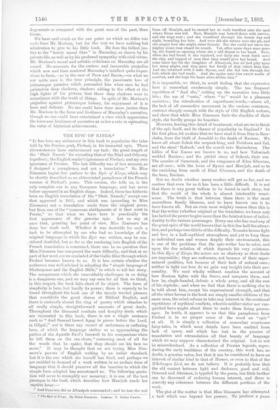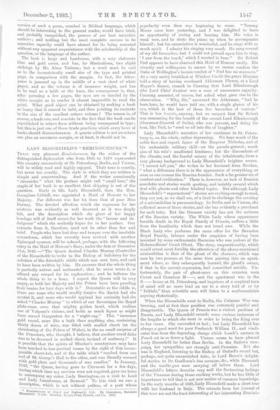THE EPIC OF KINGS*` " IT has been my endeavour
in this book to popularise the tales told by the Persian poet, Firdusi, in his immortal epic. Three circumstances have embarrassed my task : the great length of the Shah Nameh' far exceeding that of the Iliad and Odyssey together) ; the English reader's ignorance of Firdusi; and my own ignorance of Persian. The last difficulty was of less account, as I designed a paraphrase, and not a translation." So Miss Zimmern begins her preface to the Epic of Kings, which may be shortly described as an abbreviated paraphrase of the French version of Firdusi's poem. This version, she tells us, is the only complete one in any European language, and has never before appeared in an English shape. Indeed, there has hitherto been no English translation of the " Shah Nameh," except one that appeared in 1835, and which was (according to Miss Zimmern) not a translation made from the original poem, but from one of the " numerous abridgments of it that exist in Persia," so that what we have here is practically the first appearance of the genuine epic. Let us say at • once that, granting her point of view, Miss Zimmern has done her work well. Whether it was desirable for such a task to be attempted by one who had no knowledge of the original language in which the Epic was written, may be con- , sidered doubtful, but as far as the rendering into English of the French translation is concerned, there can be no question that Miss Zimmern has conquered the main difficulty, and that at no part of her work are we reminded of the Gallic filter through which Firdusi becomes known to us. It is less certain whether the authoress was well advised in adopting the " simple language of Shakespeare and the English Bible," in which to tell her story. The comparison which she unavoidably challenges in so doing is a dangerous one, and we may say once for all that we think, in this respect, the book falls short of its object. The form of simplicity is here, but hardly its power ; there is scarcely to be found throughout the book one of the tersely worded phrases that constitute the great charm of Biblical English, and there is curiously absent the ring of poetry which attaches to all really simple, straightforward accounts of great deeds. Throughout the thousand combats and doughty deeds which are recounted in this book, there is not a single sentence such as " And Samuel hewed Agag in pieces before the Lord, in Gilgal ;" nor is there any record of endurance or suffering here, of which the language strikes us as approaching the pathos of the Apostle Paul's farewell to his companions when he left them on the sea-shore," sorrowing most of all for the words that he spake, that they should see his face no more." It may be thought that we are trying Miss Zim- merit's powers of English writing by an unfair standard, but it is the one which she herself has fixed, and perhaps we are entitled to demand of a work written in an archaic form of language that it should preserve all the beauties to which the simple form adopted has accustomed us. The following quota- tion will serve to exemplify our meaning ; it is one of the best passages in the book, which describes how Manijeh tends her captive lover :-
"" And Geraiwaz did as Afrasiyab commanded ; and he tore the veil * The Epic of Kinpa. By Helen Zimmerli. Louden : T. Fisher Unwiu.
from off Manijeh, and he caused her to walk barefoot unto the spot where Bizun was hid. Now, Manijeh was bowed down with sorrow, and she wept sore ; and she wandered through the desert day and night, bewailing her fate. And over did she return unto the pit, and she sought how she might enter therein. But she could not move the mighty stone that closed its mouth. Yet, after some days were gone by, she found an opening where she c mid thrust in her hand. Now, when she had found it she rejoiced, and daily she went forth unto the city, and begged of men that they would give her bread. And none knew her for the daughter of Afrasiyab, but all had pity upon her sorry plight, and they gave her freely of that which they had. And she returned with it unto Byzun, and she fed him through the hole which she had made. And she spoke unto him sweet words of comfort, and she kept his heart alive within him."
It is impossible, we think, to avoid feeling that the expression here is somewhat cumbrously simple. The too frequent repetition of "And she," cutting up the narrative into little bits ; the use of " unto," where " to " would be a pleasant variation ; the introduction of superfluous words,—above all, the lack of all connective movement in the various sentences, contrast sharply enough with the style of Old English writers, and show that while Miss Zimmern feels the shackles of their style, she hardly grasps its beauties.
However, leaving this detail of treatment, what arc we to think of the epic itself, and its chance of popularity in England P In
the first place, let us state that we have read it from Dan to Beer- sheba, from the birth of Jemshid to the death of Rustem. We know all about Zohak the serpent-king, and Feridoun and Zal, and the steed Ralcush,' and the march into Maziuderan. The follies of Kai Kamm are known to us, and how Tahmineh wedded Rustem ; and the pitiful story of Sohrab, their son. The murder of Sarawush, and the vengeance of Khai Khosrau, are all ours ; with the loves of Byzun and Manijeh, and so to the vanishing from earth of Khai Khosrau, and the death of the hero, Rustem.
But we doubt whether many readers will get as far, and we confess that even for us it has been a little difficult. It is not that there is any great tedium to be found in each story, but that the result of the whole is almost intolerably weari- some. The truth is that between them there is the most marvellous family likeness, and to have known one is to have known all. But an even more weighty reason than this is that the writer (whether original or the translator, we know not) has lacked the power to give more than the faintest trace of indivi- duality to the various personages. Every one who has read any of the great epics of the world knows that in this lies half the attrac- tion, and perhaps two-thirds of the difficulty. To make heroes fight and love in a half-mythical atmosphere, and yet to keep them as individual men and women despite their environment, this is one of the problems that the epic-writer has to solve, and upon the due solution of which depends his very existence. In this Epic of Kings, the actors are as shadowy as their deeds are impossible ; they are unhuman, not because of their super- natural qualities, tut because of their lack of natural ones ; neither in fight nor love do we gain any insight into their per- sonality. We read wholly without emotion the account of how Rustem fights with the Deevs, and conquers them, and how ho, single-handed, defeats a whole army, and all the rest of his exploits ; and when we find that there is nothing else to be told about him, except his supernatural strength, and that all the other heroes in the book are simply smaller editions of the same man, the mind refuses to take any interest in the continual repetitions of mythical conflicts, wherein neither victor nor van- quished have aught about them to make them living person- ages. In truth, it appears to us that this paraphrase from Firdusi is in no proper sense of the word an " epic " at all. It is simply a collection of somewhat wearisome fairy-tales, in which most details have been omitted from lack of space, and which has lost in the process of' translation and retranslation all that beauty of language which we may suppose characterised the original. Let us not be misunderstood. As a collection of Persian legends, repro- ducing the early traditions of the country, this work has, no doubt, a genuine value, but that it can be considered to have an interest of similar kind to that of Homer, or even to that of the Nibelungen Lied, we do not believe. It is probably true that the old contest between light and darkness, good and evil, Ormuzd and Ahriman, is typified by the poem, but little further can be discerned of enduring human interest, and there is scarcely any coherence between the different portions of the work.
The gist of the matter is that Miss Zimmern has attempted a task which was beyond her powers. To produce a prose version of such a poem, couched in Biblical language, which should be interesting to the general reader, would have tried, and probably vanquished, the powers of our best narrative authors ; and nothing but the most complete success in its narrative capacity could have atoned for its being executed without any apparent acquaintance with the scholarship of the question, or the langtiage of the author.
The book is large and handsome, with a very elaborate blue and gold cover, and has, for illustrations, two slight etchings by Mr. Alma Tadema ; but a word must be said as to the inconsistently small size of the type and printed Page, in comparison with the margin. In fact, the letter- press is jammed up in the middle of a vast sheet of white Paper, and as the volume is of immense weight, and has to be read on a table or the knee, the consequence is, that, after perusing a few pages, the eyes are so dazzled by the white margin as to render it almost impossible to read the print. What good object can be obtained by making a book BO heavy that it cannot be held, and then printing its contents in the size of the smallest octavo volume ? The reason is, of course, a trade ono, and consists in the fact that the book can be republished in octavo form without being recomposed in type ; but this is just one of those trade practices which every lover of books should discountenance. A quarto edition is not an octavo one plus an enormous margin, or at least, it should not be.







































 Previous page
Previous page